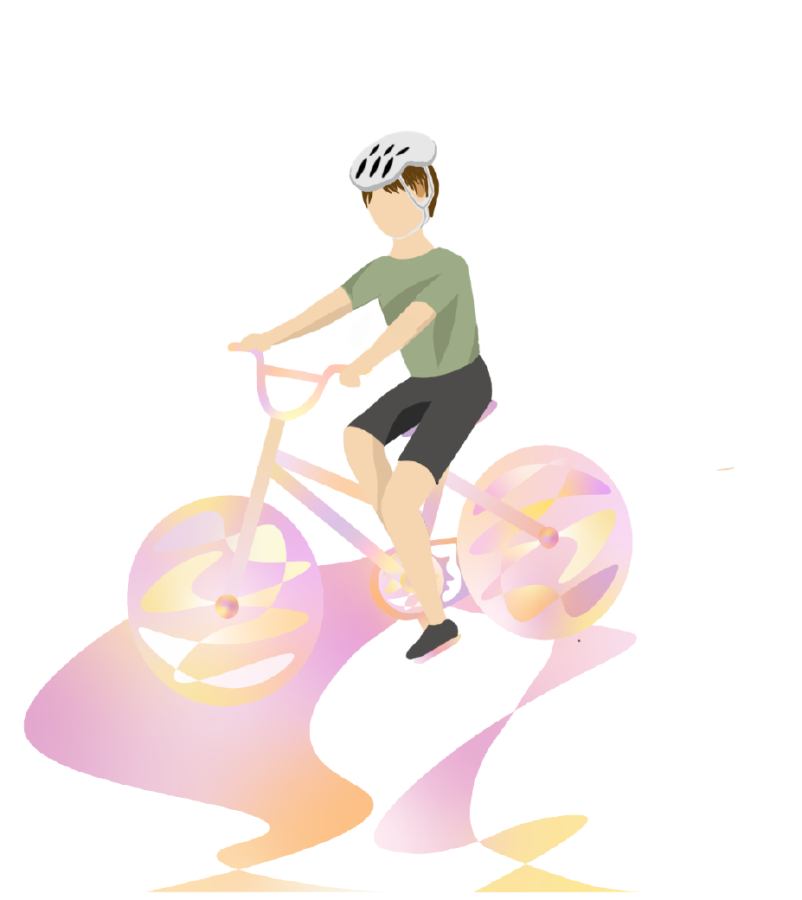Cycling onwards: Bikers find their own path
An illustration featuring a cyclist biking down a path. Cycling, in addition to being an environmentally-friendly mode of transportation, is, for many, a sport and a passion.
Cycling, in addition to being an environmentally-friendly mode of transportation, is, for many, a sport and a passion. The sport redefines the focus on the individual through lessons of personal accountability and self-motivation and serves as an opportunity to showcase competitiveness.
Upper school science teacher Chris Spenner, who replaced driving a car with biking 12 years ago as a means of traveling to and from his job, recalls the reasons behind his choice that significantly impacted his daily life.
“[When] I started teaching in Houston, I think I was at that point in my life [where I was] becoming more aware of environmental issues, and just making conscious choices about that,” Spenner said. “So I went to biking to commute to and from school.”
Along with the physical aspect of biking, Spenner highlights the effect of biking on his mentality and general physical fitness. He notes how it disconnects him from his surroundings for the span of his journey.
“When I’m commuting to and from school, it’s a different kind of mental break or a transition period from home life to work life and back,” Spenner said. “I get to look up at the sky — I get to connect to my body again and get out of my head.”
Similarly, upper school English teacher Charles Shuttleworth started out biking as a means of getting around in college but started to find more meaning within the activity as it became more prominent in his everyday life. This soon developed into a lifelong love for cycling.
“I was a poor graduate student living in New York City, and I went through one summer where I never got out of the city,” Shuttleworth said. “So I bought a bicycle and that became my mode of transportation. I started to ride out of the city and then started to go further and further.”
Shuttleworth has traversed the nation multiple times by bike, with one of his most memorable trips being a loop of the West coast, starting from Eugene, Oregon, down to Lake Tahoe and across to Colorado, followed by a route to Jasper, Alberta, and then back down to Eugene. Additionally, he has participated in several group cycling rides, such as one cross-country from Virginia to San Francisco. Between the two, he cherishes his solo rides more, as he appreciates the sense of control that he holds during the journey.
“The advantage of going alone and having your own gear is that you make all your own decisions,” Shuttleworth said. “Even if you’re with a small group of friends, you [all] have to make decisions [together]. On one hand, it’s good because the decisions are made for you, but on the other hand, you wake up and you’ve got to do it because that’s the plan, so you have no choice. I don’t like that feeling — I really like waking up and just going.”
Competitive biker Nolan Dagum (10) shares a similar view on the individuality aspect of cycling, despite being a part of the Black Mountain Composite cycling team, a tight-knit community of active cyclers, since seventh grade. He participates in regional and state competitions, which act as a series of qualifying events before competing in Nationals over the summer.
“If I don’t want to do a ride today, there’s no one stopping me,” Nolan said. “It’s not like [other sports] practice[s] where the coach expects you to show up — you are on a team but your performance depends pretty much entirely on yourself [as] you practice by yourself a lot. You’re very motivated by how well you want to do and not necessarily motivated by your coach [or] anyone else.”
Nolan notes how although any sport, cycling included, places a strong emphasis on physical ability and fitness, he believes that the underlying factor of success comes from within — it is his true passion for competitive cycling that keeps him committed.
“There’s the fact that I love the sport, and I think if you don’t [love your sport], you won’t be successful,” Nolan said. “How I do training is basically dependent on how hard [I] want to train, so people who do better are people who love the sport.”

Emma Milner (12) is an Editor-in-Chief of Harker Aquila, and this is her fourth year on staff. This year, Emma wishes to experiment with new story formats...

Katelyn Zhao (12) is the co-editor-in-chief of Humans of Harker, and this is her fourth year on staff. Katelyn aims to honor each of the stories within...


















![“[Building nerf blasters] became this outlet of creativity for me that hasn't been matched by anything else. The process [of] making a build complete to your desire is such a painstakingly difficult process, but I've had to learn from [the skills needed from] soldering to proper painting. There's so many different options for everything, if you think about it, it exists. The best part is [that] if it doesn't exist, you can build it yourself," Ishaan Parate said.](https://harkeraquila.com/wp-content/uploads/2022/08/DSC_8149-900x604.jpg)




![“When I came into high school, I was ready to be a follower. But DECA was a game changer for me. It helped me overcome my fear of public speaking, and it's played such a major role in who I've become today. To be able to successfully lead a chapter of 150 students, an officer team and be one of the upperclassmen I once really admired is something I'm [really] proud of,” Anvitha Tummala ('21) said.](https://harkeraquila.com/wp-content/uploads/2021/07/Screen-Shot-2021-07-25-at-9.50.05-AM-900x594.png)







![“I think getting up in the morning and having a sense of purpose [is exciting]. I think without a certain amount of drive, life is kind of obsolete and mundane, and I think having that every single day is what makes each day unique and kind of makes life exciting,” Neymika Jain (12) said.](https://harkeraquila.com/wp-content/uploads/2017/06/Screen-Shot-2017-06-03-at-4.54.16-PM.png)








![“My slogan is ‘slow feet, don’t eat, and I’m hungry.’ You need to run fast to get where you are–you aren't going to get those championships if you aren't fast,” Angel Cervantes (12) said. “I want to do well in school on my tests and in track and win championships for my team. I live by that, [and] I can do that anywhere: in the classroom or on the field.”](https://harkeraquila.com/wp-content/uploads/2018/06/DSC5146-900x601.jpg)
![“[Volleyball has] taught me how to fall correctly, and another thing it taught is that you don’t have to be the best at something to be good at it. If you just hit the ball in a smart way, then it still scores points and you’re good at it. You could be a background player and still make a much bigger impact on the team than you would think,” Anya Gert (’20) said.](https://harkeraquila.com/wp-content/uploads/2020/06/AnnaGert_JinTuan_HoHPhotoEdited-600x900.jpeg)

![“I'm not nearly there yet, but [my confidence has] definitely been getting better since I was pretty shy and timid coming into Harker my freshman year. I know that there's a lot of people that are really confident in what they do, and I really admire them. Everyone's so driven and that has really pushed me to kind of try to find my own place in high school and be more confident,” Alyssa Huang (’20) said.](https://harkeraquila.com/wp-content/uploads/2020/06/AlyssaHuang_EmilyChen_HoHPhoto-900x749.jpeg)



